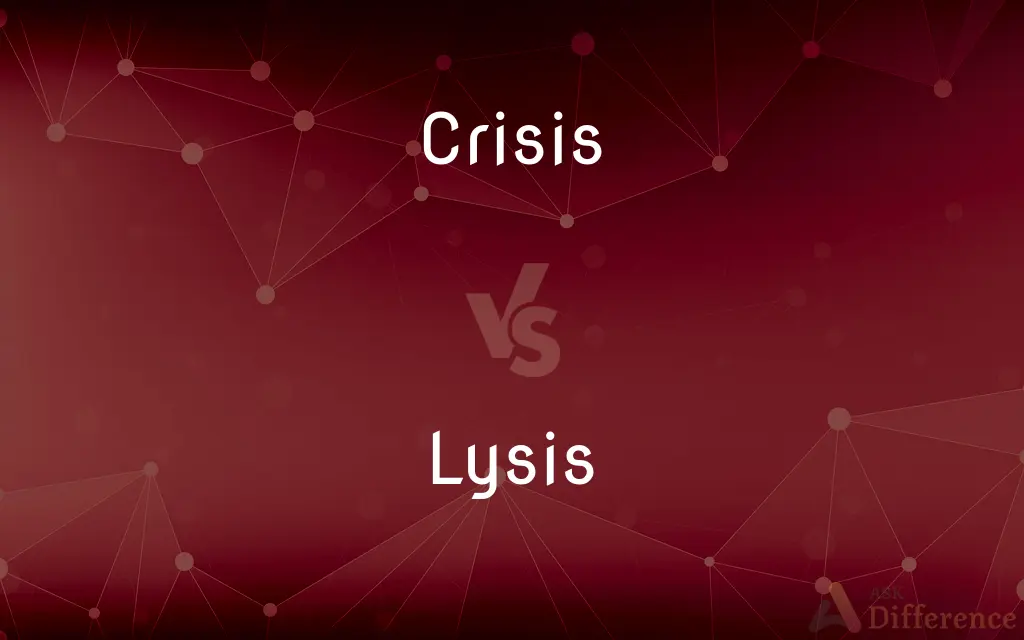Crisis vs. Lysis — What's the Difference?
By Fiza Rafique & Urooj Arif — Updated on March 17, 2024
A crisis is a pivotal or decisive moment, often leading to change or significant impact, whereas lysis refers to the breakdown or dissolution of cells or compounds.

Difference Between Crisis and Lysis
Table of Contents
ADVERTISEMENT
Key Differences
A crisis represents a turning point, whether in the context of personal affairs, societal issues, or medical conditions, characterized by instability and requiring decisive action to resolve. On the other hand, lysis in biological and chemical contexts involves the disintegration or destruction of cellular structures or chemical compounds, typically through the action of specific enzymes or other agents.
While a crisis is marked by its potential for significant change or the necessity for immediate resolution to prevent further deterioration, lysis denotes a natural or induced process of breakdown, leading to the release or decomposing of substances, which can be crucial for understanding biological mechanisms or for applications in biotechnology.
The concept of crisis is broad, encompassing psychological, environmental, economic, and health-related challenges, lysis is specific to the fields of biology, medicine, and chemistry, indicating the precise nature of its occurrence and effects.
In addressing a crisis, strategies and interventions are often focused on management, resolution, or adaptation to mitigate the impact or navigate through the difficult period. In contrast, lysis is a phenomenon observed or utilized in laboratories and medical treatments, such as in the destruction of bacterial cells by antibiotics or the breakdown of blood clots.
Comparison Chart
Definition
A crucial or decisive point of difficulty, requiring resolution
The breakdown or dissolution of cells or compounds
ADVERTISEMENT
Context
Broad (psychological, societal, medical)
Specific (biological, chemical)
Outcome
Change, resolution, or adaptation
Release or decomposition of substances
Strategies
Management, resolution, adaptation
Observation, utilization in treatments
Field of Application
Psychology, sociology, medicine
Biology, medicine, chemistry
Compare with Definitions
Crisis
A point in a disease when an important change occurs, indicating either recovery or death.
The patient reached a crisis in their illness overnight.
Lysis
The gradual decline of disease symptoms.
The patient showed signs of lysis as the fever began to subside.
Crisis
A decisive moment in the plot of a play or story.
The movie's climax brought the protagonist to a personal crisis.
Lysis
The breakdown of blood clots by medication.
The doctor recommended a treatment plan that includes thrombolysis.
Crisis
An emotional or existential state of significant distress.
He sought counseling during his midlife crisis.
Lysis
The disintegration of a cell by rupture of its cell wall or membrane.
Lysis is a common outcome of viral infection in cells.
Crisis
A time of intense difficulty or danger.
The country faced an economic crisis due to the pandemic.
Lysis
A process in molecular biology for breaking down cells to extract components.
Cell lysis is a crucial step in DNA extraction protocols.
Crisis
A sudden change in a political or business situation that requires urgent action.
The board meeting was called to address the leadership crisis.
Lysis
The dissolution of a compound during a chemical reaction.
The experiment involved the lysis of the substrate to study its components.
Crisis
A crisis (plural: "crises"; adjectival form: "critical") is any event or period that will lead, or may lead, to an unstable and dangerous situation affecting an individual, group, or all of society. Crises are negative changes in the human or environmental affairs, especially when they occur abruptly, with little or no warning.
Lysis
Lysis ( LY-sis; Greek λύσις lýsis, "a loosing" from λύειν lýein, "to unbind") is the breaking down of the membrane of a cell, often by viral, enzymic, or osmotic (that is, "lytic" LIT-ək) mechanisms that compromise its integrity. A fluid containing the contents of lysed cells is called a lysate.
Crisis
A time of intense difficulty or danger
The monarchy was in crisis
The current economic crisis
Lysis
The disintegration of a cell by rupture of the cell wall or membrane.
Crisis
A crucial or decisive point or situation, especially a difficult or unstable situation involving an impending change.
Lysis
(Medicine) The gradual subsiding of the symptoms of an acute disease.
Crisis
A sudden change in the course of a disease or fever, toward either improvement or deterioration.
Lysis
A gradual recovery from disease (opposed to crisis).
Crisis
An emotionally stressful event or traumatic change in a person's life.
Lysis
(biochemistry) The disintegration or destruction of cells
Crisis
A point in a story or drama when a conflict reaches its highest tension and must be resolved.
Lysis
(biochemistry) The breakdown of molecules into constituent molecules
Crisis
A crucial or decisive point or situation; a turning point.
Lysis
(architecture) A plinth or step above the cornice of the podium in an ancient temple.
Crisis
An unstable situation, in political, social, economic or military affairs, especially one involving an impending abrupt change.
Lysis
The resolution or favorable termination of a disease, coming on gradually and not marked by abrupt change.
Crisis
(medicine) A sudden change in the course of a disease, usually at which point the patient is expected to either recover or die.
Lysis
Recuperation in which the symptoms of an acute disease gradually subside
Crisis
(psychology) A traumatic or stressful change in a person's life.
I'm having a major crisis trying to wallpaper the living room.
Crisis
(drama) A point in a drama at which a conflict reaches a peak before being resolved.
Crisis
The point of time when it is to be decided whether any affair or course of action must go on, or be modified or terminate; the decisive moment; the turning point.
This hour's the very crisis of your fate.
The very times of crisis for the fate of the country.
Crisis
That change in a disease which indicates whether the result is to be recovery or death; sometimes, also, a striking change of symptoms attended by an outward manifestation, as by an eruption or sweat.
Till some safe crisis authorize their skill.
Crisis
An unstable situation of extreme danger or difficulty;
They went bankrupt during the economic crisis
Crisis
A crucial stage or turning point in the course of something;
After the crisis the patient either dies or gets better
Common Curiosities
Is lysis always a positive outcome?
In medical or biological contexts, lysis can be positive, such as when breaking down harmful cells or substances, but it can also indicate unwanted cell damage.
What is the main difference between a crisis and lysis?
A crisis is a turning point requiring resolution, often associated with difficulty or danger, while lysis refers to the breakdown or dissolution of cells or compounds.
Can lysis occur during a crisis?
Yes, in medical contexts, lysis can occur during a health crisis, such as the breakdown of cells in response to infection or treatment.
Can both terms apply in medical contexts?
Yes, both terms can apply in medical contexts, but they refer to different concepts: crisis denotes a critical turning point in an illness, while lysis refers to the breakdown of cells or substances.
How is a crisis resolved?
A crisis is resolved through decisive action, management strategies, or interventions designed to navigate or mitigate the situation.
What makes a situation a crisis?
A situation is considered a crisis when it reaches a critical point that requires urgent resolution, posing significant risk or danger if not addressed.
Can lysis be artificially induced?
Yes, lysis can be artificially induced in laboratory settings, such as using enzymes or chemicals to break down cells for research purposes.
Do crises always lead to negative outcomes?
Not necessarily. While crises are challenging, they can lead to positive change, recovery, or the resolution of a problem through effective management.
How is lysis used in scientific research?
Lysis is used in scientific research to break down cells or substances to study their components, such as in DNA extraction or studying the effects of antibiotics.
What role does lysis play in the immune response?
Lysis plays a crucial role in the immune response by allowing the destruction of infected or foreign cells, thereby protecting the body.
How do individuals cope with a crisis?
Individuals cope with a crisis through various means, including seeking support, employing coping strategies, and adapting to new circumstances.
How can understanding lysis benefit medical treatments?
Understanding lysis can improve medical treatments by aiding in the development of therapies that target the breakdown of harmful cells, such as cancer cells or pathogens.
Can a crisis be prevented?
Some crises can be prevented or mitigated with foresight, planning, and early intervention, though not all are predictable.
How do societies recover from a crisis?
Societies recover from a crisis through resilience, adaptation, and often through implementing changes to prevent future occurrences.
Share Your Discovery

Previous Comparison
Superior vs. Supervisor
Next Comparison
Taxi vs. CabAuthor Spotlight
Written by
Fiza RafiqueFiza Rafique is a skilled content writer at AskDifference.com, where she meticulously refines and enhances written pieces. Drawing from her vast editorial expertise, Fiza ensures clarity, accuracy, and precision in every article. Passionate about language, she continually seeks to elevate the quality of content for readers worldwide.
Co-written by
Urooj ArifUrooj is a skilled content writer at Ask Difference, known for her exceptional ability to simplify complex topics into engaging and informative content. With a passion for research and a flair for clear, concise writing, she consistently delivers articles that resonate with our diverse audience.
















































